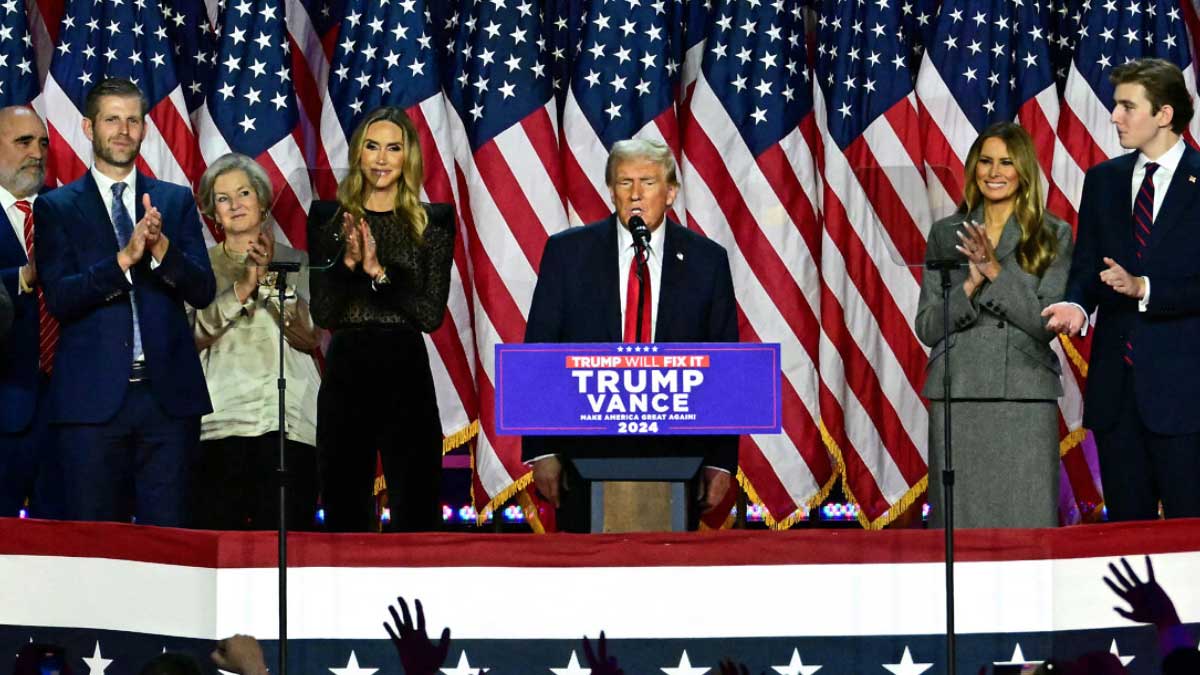- Home
- Billionaires
- Investing Newsletters
- 193CC 1000
- Article Layout 2
- Article Layout 3
- Article Layout 4
- Article Layout 5
- Article Layout 6
- Article Layout 7
- Article Layout 8
- Article Layout 9
- Article Layout 10
- Article Layout 11
- Article Layout 12
- Article Layout 13
- Article Layout 14
- Article Sidebar
- Post Format
- pages
- Archive Layouts
- Post Gallery
- Post Video Background
- Post Review
- Sponsored Post
- Leadership
- Business
- Money
- Small Business
- Innovation
- Shop
Recent Posts
Trump’s Day 1 Priorities: Immigration, Energy, Ukraine, Iran

Former President Donald Trump’s advisers revealed that his top priorities for the early days of a potential second term in office will be focused on key issues such as immigration, the oil and gas industry, the Ukraine conflict, and Iran. These priorities come shortly after Trump’s decisive victory over Vice President Kamala Harris, securing a second term.
One of Trump’s most prominent campaign promises has been to reinstate and strengthen his administration’s border policies, many of which were dismantled by President Joe Biden. Senior Trump adviser Jason Miller shared that Trump intends to bring back the controversial “Remain in Mexico” policy, which requires asylum seekers to wait in Mexico as their claims are processed. Under Trump’s first term, this was seen as a major deterrent to illegal immigration. Additionally, Trump has made it clear that his immigration strategy will go beyond previous measures. He has indicated that he will pursue even stricter policies, including mass deportations of undocumented migrants. His advisers suggest that he might activate the Alien Enemies Act of 1798, a wartime law that grants the president the power to expel individuals from the U.S. if they are believed to pose a threat, including foreign nationals linked to enemy states. Trump has proposed that this could be used to remove migrants deemed to be from countries he perceives as adversaries.
Trump has been a strong advocate for U.S. energy independence, often touting America’s vast oil and gas reserves as a key to economic growth. During his election night victory speech, Trump referred to U.S. oil reserves as “liquid gold” and vowed to return to aggressive drilling policies. His advisers confirmed that one of his first actions in office would be to prioritize expanding the U.S. energy sector, particularly by increasing drilling for oil and gas. Miller stated that Trump would expedite the approval of federal drilling permits and pipeline projects, as well as push for increased offshore drilling rights sales. Trump also plans to re-exit the Paris Climate Agreement, a move he championed during his first term. Trump’s “drill baby drill” mentality aims to reverse many of the environmental and energy policies established by the Biden administration, which have faced criticism from conservatives for their impact on the oil and gas industries. By pushing for less restrictive policies, Trump seeks to boost domestic production and reduce reliance on foreign oil, a position that resonates with many voters concerned about energy prices and the economic impact of climate-related regulations.
Another central component of Trump’s “Day 1” agenda is addressing the ongoing war in Ukraine. According to campaign spokesperson Karoline Leavitt, Trump’s goal is to facilitate negotiations between Ukraine and Russia to bring an end to the conflict. Trump has claimed that the war would never have happened if he had remained in office, citing his relationship with Russian President Vladimir Putin. Trump has even suggested that he could bring an immediate end to the war, although he has been vague on the specifics of how this would be accomplished. Trump’s stance on Ukraine has sparked debate, as he has not clearly stated whether he supports Ukraine’s victory in the conflict. Instead, he has positioned himself as a potential peacemaker, emphasizing his ability to negotiate with world leaders. His advisers argue that his strongman approach to diplomacy could lead to a swift resolution, though it remains unclear what terms would satisfy both Russia and Ukraine.
Trump’s approach to Iran is expected to be another critical part of his foreign policy agenda in a second term. Leavitt confirmed that Trump would reinstate harsh sanctions on Iran, specifically targeting its oil exports and economic activities. These sanctions were a hallmark of Trump’s “maximum pressure” policy during his first term, and they were designed to cripple Iran’s economy and halt its nuclear ambitions. Trump’s team believes that reimposing these sanctions would restore stability to the Middle East and deter Iranian aggression. While some argue that Trump’s sanctions policy created tensions with European allies and pushed Iran closer to pursuing nuclear weapons, Trump’s advisers insist that it effectively isolated Iran and limited its ability to interfere in regional conflicts.
In addition to his foreign policy and immigration priorities, Trump’s economic proposals have been a significant point of focus during his campaign. High inflation rates under the Biden administration have become a key criticism from Trump, who has pledged to combat rising prices by implementing broad tariffs on imported goods. Trump has proposed raising foreign tariffs by 10%, with a more aggressive 60% tariff on Chinese imports. While these tariffs are intended to protect U.S. industries, economic experts have warned that they could lead to higher consumer prices, potentially reducing spending power and increasing unemployment. Trump has also promised to push for tax cuts, including eliminating taxes on tips, overtime pay, and Social Security income. This would require changes to the tax code, a process that would be facilitated if Republicans retain control of the House and Senate following the midterm elections. This economic agenda is designed to appeal to voters who are struggling with inflation and economic uncertainty, but it could face significant opposition from Democrats and economists concerned about its potential effects on the broader economy.
Trump’s resounding victory in the election, which was confirmed by the Associated Press after he won critical battleground states like Pennsylvania, Wisconsin, and Michigan, has set the stage for his return to the White House. His performance among key voter demographics, particularly young men and Latino voters, has given him a strong mandate. Trump’s advisers are confident that with Republican control of Congress, his proposed agenda can be swiftly implemented. While the specifics of his first-term policies may evolve, the overarching themes of immigration control, energy independence, hardline foreign policy, and economic nationalism remain central to his vision for a second term. The coming months will reveal how these policies are put into action and what impact they have on the political landscape moving forward.
Recent Posts
Categories
- 193 Countries Consortium Partner1
- 193cc Digital Assets2
- 5G1
- Aerospace & Defense48
- AI37
- Arts3
- Banking & Insurance11
- Big Data3
- Billionaires1,467
- Boats & Planes1
- Business332
- Careers13
- Cars & Bikes79
- CEO Network1
- CFO Network17
- CHRO Network1
- CIO Network1
- Cloud10
- CMO Network18
- Commercial Real Estate7
- Consultant1
- Consumer Tech194
- CxO1
- Cybersecurity73
- Dining1
- Diversity, Equity & Inclusion4
- Education7
- Energy8
- Enterprise Tech29
- Events11
- Fintech1
- Food & Drink2
- Franchises1
- Freelance1
- Future Of Work2
- Games149
- GIG1
- Healthcare79
- Hollywood & Entertainment203
- Houses1
- India’s 1000 Richest1
- Innovation46
- Investing2
- Investing Newsletters4
- Leadership65
- Lifestyle11
- Manufacturing1
- Markets20
- Media327
- Mobile phone1
- Money13
- Personal Finance2
- Policy569
- Real Estate1
- Research6
- Retail1
- Retirement1
- Small Business1
- SportsMoney42
- Style & Beauty1
- Success Income1
- Taxes2
- Travel10
- Uncategorized14
- Vices1
- Watches & Jewelry2
- world's billionaires1,436
- Worlds Richest Self-Made Women2
Related Articles
South Korea Plane Crash: A Tragic Loss and Global Mourning
The tragic plane crash at South Korea’s Muan International Airport on Sunday...
By 193cc Agency CouncilDecember 30, 2024H-1B Visa Debate Splits Trump Allies and Silicon Valley
The debate over H-1B visas has once again become a contentious issue,...
By 193cc Agency CouncilDecember 28, 2024Trump Moves $4B Stake in Truth Social Parent, Stock Drops 6%
Donald Trump recently transferred his 57% stake in Trump Media & Technology...
By 193cc Agency CouncilDecember 20, 2024House Rejects Trump-Backed Funding Bill, Shutdown Looms
The U.S. House of Representatives rejected a new government funding bill on...
By 193cc Agency CouncilDecember 20, 2024















Leave a comment